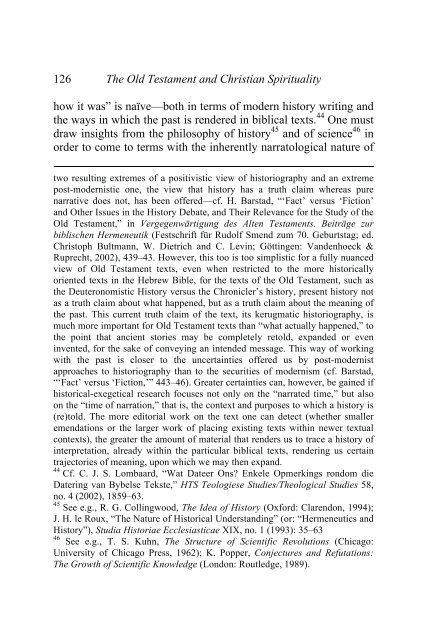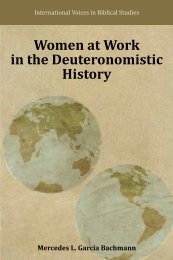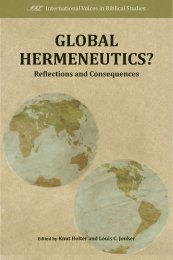The Old Testament and Christian Spirituality - International Voices in ...
The Old Testament and Christian Spirituality - International Voices in ...
The Old Testament and Christian Spirituality - International Voices in ...
Create successful ePaper yourself
Turn your PDF publications into a flip-book with our unique Google optimized e-Paper software.
126 <strong>The</strong> <strong>Old</strong> <strong>Testament</strong> <strong>and</strong> <strong>Christian</strong> <strong>Spirituality</strong><br />
how it was” is naïve—both <strong>in</strong> terms of modern history writ<strong>in</strong>g <strong>and</strong><br />
the ways <strong>in</strong> which the past is rendered <strong>in</strong> biblical texts. 44 One must<br />
draw <strong>in</strong>sights from the philosophy of history 45 <strong>and</strong> of science 46 <strong>in</strong><br />
order to come to terms with the <strong>in</strong>herently narratological nature of<br />
two result<strong>in</strong>g extremes of a positivistic view of historiography <strong>and</strong> an extreme<br />
post-modernistic one, the view that history has a truth claim whereas pure<br />
narrative does not, has been offered—cf. H. Barstad, “‘Fact’ versus ‘Fiction’<br />
<strong>and</strong> Other Issues <strong>in</strong> the History Debate, <strong>and</strong> <strong>The</strong>ir Relevance for the Study of the<br />
<strong>Old</strong> <strong>Testament</strong>,” <strong>in</strong> Vergegenwärtigung des Alten <strong>Testament</strong>s. Beiträge zur<br />
biblischen Hermeneutik (Festschrift für Rudolf Smend zum 70. Geburtstag; ed.<br />
Christoph Bultmann, W. Dietrich <strong>and</strong> C. Lev<strong>in</strong>; Gött<strong>in</strong>gen: V<strong>and</strong>enhoeck &<br />
Ruprecht, 2002), 439–43. However, this too is too simplistic for a fully nuanced<br />
view of <strong>Old</strong> <strong>Testament</strong> texts, even when restricted to the more historically<br />
oriented texts <strong>in</strong> the Hebrew Bible, for the texts of the <strong>Old</strong> <strong>Testament</strong>, such as<br />
the Deuteronomistic History versus the Chronicler’s history, present history not<br />
as a truth claim about what happened, but as a truth claim about the mean<strong>in</strong>g of<br />
the past. This current truth claim of the text, its kerugmatic historiography, is<br />
much more important for <strong>Old</strong> <strong>Testament</strong> texts than “what actually happened,” to<br />
the po<strong>in</strong>t that ancient stories may be completely retold, exp<strong>and</strong>ed or even<br />
<strong>in</strong>vented, for the sake of convey<strong>in</strong>g an <strong>in</strong>tended message. This way of work<strong>in</strong>g<br />
with the past is closer to the uncerta<strong>in</strong>ties offered us by post-modernist<br />
approaches to historiography than to the securities of modernism (cf. Barstad,<br />
“‘Fact’ versus ‘Fiction,’” 443–46). Greater certa<strong>in</strong>ties can, however, be ga<strong>in</strong>ed if<br />
historical-exegetical research focuses not only on the “narrated time,” but also<br />
on the “time of narration,” that is, the context <strong>and</strong> purposes to which a history is<br />
(re)told. <strong>The</strong> more editorial work on the text one can detect (whether smaller<br />
emendations or the larger work of plac<strong>in</strong>g exist<strong>in</strong>g texts with<strong>in</strong> newer textual<br />
contexts), the greater the amount of material that renders us to trace a history of<br />
<strong>in</strong>terpretation, already with<strong>in</strong> the particular biblical texts, render<strong>in</strong>g us certa<strong>in</strong><br />
trajectories of mean<strong>in</strong>g, upon which we may then exp<strong>and</strong>.<br />
44 Cf. C. J. S. Lombaard, “Wat Dateer Ons? Enkele Opmerk<strong>in</strong>gs rondom die<br />
Dater<strong>in</strong>g van Bybelse Tekste,” HTS Teologiese Studies/<strong>The</strong>ological Studies 58,<br />
no. 4 (2002), 1859–63.<br />
45 See e.g., R. G. Coll<strong>in</strong>gwood, <strong>The</strong> Idea of History (Oxford: Clarendon, 1994);<br />
J. H. le Roux, “<strong>The</strong> Nature of Historical Underst<strong>and</strong><strong>in</strong>g” (or: “Hermeneutics <strong>and</strong><br />
History”), Studia Historiae Ecclesiasticae XIX, no. 1 (1993): 35–63<br />
46 See e.g., T. S. Kuhn, <strong>The</strong> Structure of Scientific Revolutions (Chicago:<br />
University of Chicago Press, 1962); K. Popper, Conjectures <strong>and</strong> Refutations:<br />
<strong>The</strong> Growth of Scientific Knowledge (London: Routledge, 1989).




